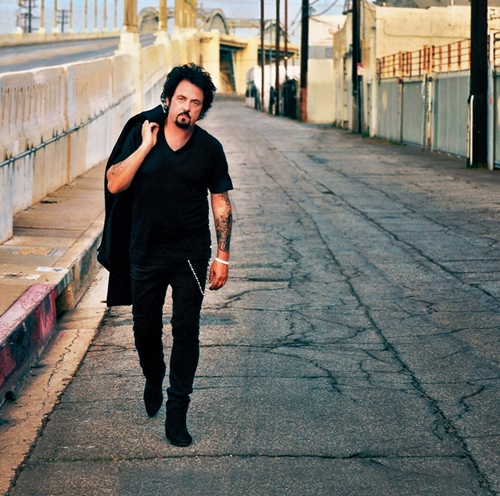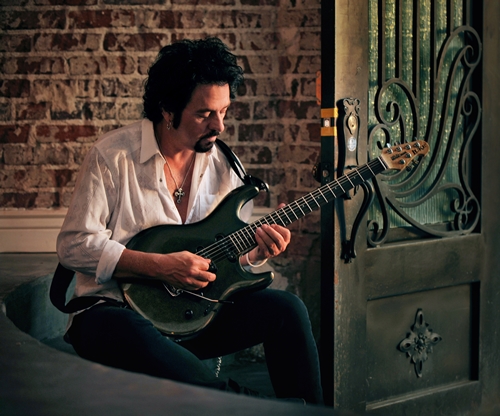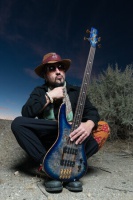Posted January, 2013
 Photo by Rob ShanahanSince the launch of Boomerocity over three years ago, I’ve had the privilege of interviewing lots of phenomenal, historic and iconic talent. Whether chatting it up with Grand Funk Railroad (and former KISS) guitarist, Bruce Kulick, Billy Joel’s sax man, Mark Rivera, or guitar virtuoso, Andy Timmons, to a man each and every one of them mentioned Steve Lukather.
Photo by Rob ShanahanSince the launch of Boomerocity over three years ago, I’ve had the privilege of interviewing lots of phenomenal, historic and iconic talent. Whether chatting it up with Grand Funk Railroad (and former KISS) guitarist, Bruce Kulick, Billy Joel’s sax man, Mark Rivera, or guitar virtuoso, Andy Timmons, to a man each and every one of them mentioned Steve Lukather.
Luke (as his friends call him) is best known as a founding member/lead guitarist/songwriter/vocalist of Toto. However, he has also been involved with some of the hottest songs and albums in the history of popular music. From Michael Jackson’s Beat It (and all of the Thriller album) to Olivia Newton-John’s Physical, to working with such huge talent as Lionel Richie, The Tubes, Donna Summer, Chicago, Richard Marx, Joe Satriani, Steve Vai and, currently, Ringo Starr, Lukather seems to find himself associated with the best of the best. And those members of the upper echelon of musicians have great things to say about him.
Bruce Kulick (KISS and Grand Funk Railroad) says of Lukather, "Steve is one of the few ‘monster’ guitar players in the music business. I am always in awe of his amazing feel and melodic ability on the guitar. This is why he's admired around the world. Luke = Guitar Legend!" Andy Timmons also speaks highly of his good friend. “Steve has been a huge influence on my playing for many years! I think I learned more from him than any other player. Like Stevie Ray, he puts so much passion and conviction into every note. Couple that with his complete control of time feel (where a note is placed in the musical phrase) and you have an amazing musician. PLUS he's beautiful and loving human being. I'm proud to call him a friend.”
As I began my chat with Luke, I wanted to verify that I had it correct that his new CD, Transition, was his seventh studio solo project.
“Yeah, I suppose so. If you count the Carlton stuff and my Christmas record then it would something like ten. But, there’s some of my side projects like Los Lobotomys and things like that. So, yeah, as far as official ‘Here I am,’ I suppose it’s seven – lucky seven, as they say!”
In listening to Transition, I sense that the album has a positive “lessons learned/I’m still standing” kind of vibe to it, for the most part. I asked Steve if I was interpreting that correctly.
“Well, you know, the last five or six years of my life I’ve had the ‘lost years’. I went through a really, really bad time. And, unfortunately, when you go through a bad time in the public eye you have to do it in front of people. I was dealing with some people I didn’t want to be dealing with. There was some business things going on. My mother died. My marriage died. I had a kid during the divorce. I quit drinking and smoking and got really healthy. I had to go through all of the psychological stuff, digging up the bodies in my backyard, metaphorically speaking – emotionally – just to clean up myself and find my muse and find my voice as a guitar player and as an artist again.
“On the last album, I was going through all of it so it was a little darker. On this one, this is a little bit more the transition, hence, the title, coming from the darkness into the light again, as it were; dealing with all of the haters and things that I’ve just stuffed for so many years – some stuff that I really don’t want to get into but a lot of deep stuff in my personal life that was causing me to drown myself in a sea of alcohol which affected my playing, my personality, my muse, my reason for everything.
“So, I just woke up one day and quit smoking and quit drinking and said, ‘I’ve want to be me again!’ Thirty-six years on the road can make anybody crazy. I just caught myself. I looked around me and a lot of my friends are sick, dying or dead. I’m going, ‘Wait a second.’ When you’re twenty years old it’s party till you drop and then you realize that thirty-five years went by. Like I said, I went through a bad time and I’m not in a bad time now. I’m in a great place. For years, now, I’ve been clean and finding myself. I work out. I practice. I wake up at five in the morning and play the guitar. I’m a good dad. Even my ex-wives love me! I’m a happily divorced guy! What can I say?”
 Photo by Rob ShanahanThen, being a little more serious, Luke adds, “I’m on the road nine months out of the year. It’s hard for a woman to deal with that. I didn’t do anything awful. It just fell apart, you know? So, I had to re-calibrate my life – every aspect of it – and own up to the fact that I screwed up and played sloppy. You play how you feel. So, if you feel like crap, what do you think is going to happen? I was angry and I was just playing crap and I hated it.
Photo by Rob ShanahanThen, being a little more serious, Luke adds, “I’m on the road nine months out of the year. It’s hard for a woman to deal with that. I didn’t do anything awful. It just fell apart, you know? So, I had to re-calibrate my life – every aspect of it – and own up to the fact that I screwed up and played sloppy. You play how you feel. So, if you feel like crap, what do you think is going to happen? I was angry and I was just playing crap and I hated it.
“From 2004 through 2009 were bad times for me in my whole life. It affected every aspect of it – playing, I looked like crap, I felt like crap and I was just trying to get through it
in a negative way. Now, I feel good again. I feel free from it! I have to let go of resentments and the past. If I’ve said or did something stupid, I’m really sorry, you know? But I can’t change people’s minds if there’s that negativity but I think people have warmed up to the fact that I admitted my sins. What can I say? Everybody loses their way sometimes – at one point or another. It’s just hard when you have to do it in public.
“I’ve lived an extraordinary and insane life – not even a realistic one. It’s a bizzaro life. It’s fun. I mean, it has great rewards but I don’t get paid for the gig. I get paid for the twenty-two hours that I’m not playing, you know what I mean? A lot of guys will tell you that – it’s a cliché but it really stands true.
“But I feel great! I feel better than ever. I’m working with Ringo who’s seventy-two years old and looks like he’s forty. He’s a constant source of inspiration as a human being as well as being Ringo!”
In concluding his answer, he said, “I don’t want to dwell on anything negative. I’m just saying that this is where I’ve been, that’s what it was, this is what I’ve gone through and this is where I am now. I feel great – better than ever! Ready to hit it! I’ve had a really great year and I appreciate that more than I ever did ever in my whole life. I appreciate my career more than I ever did in my whole life.”
I asked if that was the biggest lesson learned from that whole experience.
“Yes! I think it’s great to still be here after thirty-six years of doing this and be booked up. I’m solid until 2015, pretty much. I couldn’t be happier doing all the different kind of cool things that I get to do. I’m just not a guy that’s in a band, makes a record and goes on the road. I did five different tours this year.”
In setting up my next question, I mentioned that it was reported that Lukather had a hand in over 1,500 albums. Before I could segue to the core question, he interrupted me.
“These numbers get volleyed around. Sometimes it’s a thousand. Sometimes it’s 2,500. Sometimes it’s a million. Sometimes it’s 50. I don’t know. I like to refer to as that I’ve done a lot of records. I really don’t know what the count is. But I’ve stopped doing sessions twenty-some-odd years ago. I’ll do a guest one or two a year or something like that here and there. But as far as being a session guy, I’ve never really done that since 1992 or something like that.”
I asked him how working on Transition differed from all of the other albums – especially the first albums he ever worked on.
“Well, the technology’s changed, obviously. I just kinda flow. Listen, when my first record came out on eight-track. That’s how long I’ve been doing this. So, really, for me, we did it differently in the sense that, from the moment my fingers touched the guitar strings and we played the first chord or riff – which, ironically, was Judgment Day – the songs were written almost in sequence as they appear on the record. C.J. Vanston and myself co-wrote and co-produced and played on the record with me.
“From the moment we started, everything that I played became a master recording and we just sort of went about it in a different way. Usually, I cut live tracks with live players. This time we did it different. I started adding people as the songs and record took shape – adding bass and drums later – after I’d done vocals and guitars and master keyboard. Then, we kind of cast it like a movie. Like, ‘Who would be great on this?’ I used my live band, obviously. They’re great musicians. Steve Weingart, Renee Jones and Eric Valentine. But I also had the pick of a lot of friends – a lot of people I had run into on the street by accident. I live in L.A., you know. We’re all friends. Everybody on the record is my friend. Some really old friends and some newer friends. All are really great musicians. We would say, ‘Wouldn’t it be great to have so-and-so on this track?’ and they came and played! That’s how we did it. It was a different way of doing it for me and it was a lot of fun.”
When I asked Steve how long Transition took to make, he said, “On and off – I started last December and I would work on it for a few weeks, go on the road, do a tour, come back, work on it for three weeks, go back on another tour and I did that all year until I finished in October.”
Going into further detail as to how the album was made, Steve shared that, “We worked hard on it. I certainly didn’t phone it in, you know? Having the luxury of time, I would go, ‘I want to redo that vocal. I can do better.’ Or, ‘that lyric sucks. Let me fix that.’ That was a luxury I haven’t had in I can’t remember when. Not being under pressure. Not worry about it being a hit single or whatever. I made a record that I liked. C.J. worked hard on the music. My son (Trevor) co-wrote a track . . . but most of it was me and C.J. I just kind of wrote how I felt and that’s how it is from a guitar playing standpoint. I dug a little deep and try to refine it rather than trying to be super flashy. Other guys do it so much better. I went to my strongest point which is my melodic phrasing and play different stuff than a normal rock guy would play.”
As I’ve said in other interviews, I long ago quit asking artists what their favorite song is on an album. However, what I have asked, and did ask Luke, was if he was to point to just one song from Transition for someone to listen to in order to determine if they would want to buy the whole album, which song would that be?
“It kind of changes. Like, in the middle of making the record, you have your favorites but that changes as they get finished. At the end of it, I look at the record as one whole piece – the whole record. Not just one song. I’m proud of the (whole) record. I think the first couple of tracks kind of definite it. Judgment Day and Creep Motel kind of have the overall feel for the record. From a guitar playing, songwriting and signing standpoint, check that out. And, if you like that, keep on!”
Knowing that Lukather is going back on the road with Ringo Starr beginning February 2nd, I asked him if there are any tour plans to support Transition after that tour.
“Oh, yeah! I’m rehearsing my band in January and then we’re going out in March and April in Europe for the solo stuff. Then I come back and gear up for Toto’s 35 year anniversary tour which will go on for the summer. We only work through the summer – May through September - because everybody else has stuff going on. We’ll do that for the next few summers all over the world. I’ll be back and then we go back out with Ringo in the fall, so I hear. Rumors. That puts me to this time next year and then I jump back out solo. I’ll do some dates in the states with my own band. We’re talking about doing a co-bill with somebody else just to get my feet wet as a solo artist in the U.S. but Toto is going to be working in the U.S., as well. I’ve got a full dance card and it feels good, man!”
As noted earlier, Luke has worked on a boatload of albums in his nearly 40 year career. I was curious as to what he saw as the most positive and negative changes he’s seen Photo by Rob Shanahan in the music business in that time and, if he were named music czar, what would he do, if anything, to fix the music business.
Photo by Rob Shanahan in the music business in that time and, if he were named music czar, what would he do, if anything, to fix the music business.
Answering the second part of the questions first, Luke said, “The first thing I would do is unplug ProTools and ask, ‘Can you sing and play?’ That would be the first thing. That would eliminate about ninety percent of the people. I’d want to level the playing field. For those of us who started out playing and thinking that you had to be really good to make it in the music business, we were all of a sudden thrown off the horse by going, ‘Nah! You don’t have to be that good, really.’ The whole image/MTV years and then it became the technological years where people are up for Grammy’s who couldn’t sing Happy Birthday in tune at gunpoint.
“I think the whole game has changed and the worst part is no one cares – or, I should say not that many people care. Nobody’s perfect. The thing is, now, records are made so perfect that they’re unrealistic. And, to perform live, if someone sings just a little bit off or doesn’t bend a note just perfect, people think you’re crap. Go back and look at The Stones and The Beatles, there’s imperfections in the blues players we all loved. Hendrix wasn’t perfect. Nobody’s perfect. It’s an unrealistic perfection. Everyone wants this utopian perfection that is unrealistic. Let’s bring back a little grit and funk, man! We live in a fast-food mentality. Everybody wants everything now and everybody has a two second attention span. I don’t believe that’s across the board but that’s what the media plays to – the lowest common denominator. I don’t want to start ragging on people and naming names but anybody that uses the word ‘beats’ to describe music should be beat-en with a baseball bat!”
Up on a well-deserved musical soapbox, he continued, “I watched the 12/12/12 concert on TV and there were some brilliant performances, you know? And the one, blatant WTF moment was rather obvious, need I say it? And instead of me being a grumpy old man, I turned on Twitter and watched the comments come. And my twenty-five year old son – a great guitar player and the generation that that plays to – I look at him and I go, ‘Dude!’ and he goes, ‘Dad, it sucks, I know!’ And I go, ‘Okay, so it’s not just me?’ I wanted to love it! I do want to love it but I can’t. I just can’t! Then, the attitude that goes with it! It’s the whole Star Magazine/Enquirer mentality of ‘let’s dumb it all down.’ To me, ‘yuh!’ is not a lyric, you know? Just unplug the box and waddaya got? Unplug the auto-tune and put the kid up there with a band and let’s see what he’s got! Nothing. Nothing! Nothing but a bad attitude and a lot of money! I don’t want to say the name but there’s just this whole genre of people, they’re bragging about how rich they are and, really, it just makes them look how stupid they are. The arrogance of it all.”
Winding done, Luke concluded, “The bottom-line: You really want to change the music business? Can-you-play? It’s like they want to learn all of the tricks before they learn how to get there. Those of us who started out in the sixties playing the guitar like I did because of The Beatles, learned how to play folk guitar and learned how to play rhythm guitar. Can you play with other people or are you the guy that just sits on the edge of your bed and plays as fast as you possibly can in one key because you don’t know how to play in B Flat? Be a well-rounded guy! There are some amazing musicians out there that need to be heard! The problem is how do you monetize it? How do you make a career as a musician? It’s really hard.
“My son. Twenty-five. He just signed with a major management company but, generally, if he was to have signed his record deal twenty-five years ago, he would’ve had his record deal at twenty! It’s a different world and there’s a lot of incredible musicians struggling just to get heard. They say, ‘Give the records away for free and then go out and play live and make money.’ Well, how many venues, really, are there and how much money are people are gonna spend? If you have one song on the radio do you think people will pay fifty bucks to come see you? Can you sustain an audience for an hour and a half with one song? Because that’s what they’re telling you, ‘We only need one song.’ Well, if you make only one song, who’s going to pay to come see you live? And you better be good because everyone does it on ProTools and you can make anybody sound good on there. But can you pull it off live?”
As our time to chat was quickly coming to a close, I asked the legendary guitarist about working with Ringo Starr on his current tour.
“It was the best summer vacation of my life! He’s the greatest! He’s one of the most sweetest, the most soulful, smart, funny – everything you could ever want and imagine him to be, he’s that and more. Very wise. If you listen to him speak, you’re drawn into somebody that is very, very special on planet earth and I’m honored to call him a friend. I wake up and I get a text from Ringo! It’s surreal. He announces me (and slides into a pretty good Ringo imitation), ‘This is my very last, real best friend and I’m not having any more!’ and he announces me. I mean, really, he took a shine to me and I to him, obviously. The band is so great: Todd (Rundgren) and Richard (Page) and Biss (Gregg Bissonette) and Mark Rivera and Gregg Rolie – what a joy to wake up and make music with these guys! Everybody is so good and so much fun. It’s so relaxed. We’re hanging out with Ringo! How awesome is that? It doesn’t get much better than that!”
Winding up that portion of his comments, he added, “What’s wrong with my life? Nothing, really. I’m grooving. I’m thankful. I really, really am! I know how lucky I am. There’s a million guys that are better than me. I’m just the lucky guy that gets to enjoy what I get to do!”
My final question for Steve Lukather involved how he wants to be remembered and what he hopes his legacy is after he’s gone to that great gig in the sky. His answer started with a slight chuckle.
“Well, I’d like to think that people will say, ‘Good player, man! Funny guy! Good guy!’ All I know is that I’m trying to be the best ‘me’ I can be right now. I’ve had an extraordinary, wonderful career that spans thirty-six years and it seems to going to keep going for a while. I’m very thankful for that. I think that maybe in a hundred years somebody will poke my name in some little computer box and, hopefully, a whole bunch of information will come out and they’ll say, ‘Who the heck is this guy?’ I’d like for them to say ‘He was a funny guy. Played pretty good for a white guy.’ What can I say? I’d like to be remembered in some positive light. I can’t make a quote about myself!”
Well, as I started this piece with quotes from other great musicians, Steve can be assured that there are many, many more members on the short list of musical greats who are saying great things about him. And, to paraphrase a great saying about music: If words fail, then his music will speak for him.










